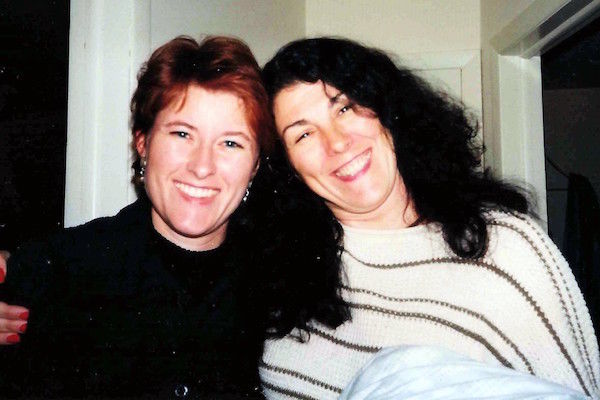By Erica Chayes Wida
Susan Merkel was born April 26, 1963 to Joan Babbage and Vernon Ellsworth in a small New Jersey town. By August of that year, she was adopted by Gus and Janet Merkel. While Ms. Merkel was raised in a loving home alongside three brothers — one who was adopted and two who were the Merkels’ biological sons — she still combatted the seed of curiosity and abandonment that so many adoptees grow up with., After graduating college, Ms. Merkel set out to find her birth mother. She had the support of her family, but little from the state adoption system as well as a therapist who told her she was crazy and disrespectful for seeking the truth. Through a painstaking process and clerical fee paid to her adoption agency, Ms. Merkel was able to find her mother. The two met, and eventually developed a relationship that completed Ms. Merkel’s sense of longing., Thirty years later, Ms. Merkel, a West Windsor resident, has worked to improve adoption rights in this state and, as a therapist herself, now helps individuals as they go through the process of discovering who they are and where they came from., NJCARE, with the support of representatives such as Ms. Merkel, advocated for the The NJ Birthright Act for 34 years before it was passed in 2014 and enacted Jan. 1 of this year. The act permits adoptees 18 years and older to request and obtain a copy of their original birth certificate as well as records regarding health and socio-cultural information, such as family background, religion, ethnicity, or family trades., The state waited to enforce the Birthright Act to honor birth parents’ privacy — giving them the option to select whether they would like to be contacted, prefer to be contacted by an intermediary, or not at all. Birth parents between 1940 and 2015 were able to redact their names from the birth certificate; birth parents who give up a child after Jan. 1, 2017 will be unable to redact their names., Before the Birthright Act was passed, all records for those born between 1940 and 2015 had to be obtained through the court and rarely were requested or approved. Ms. Merkel is certain that if she had access to her original birth certificate, the painstaking and already emotional process would have been significantly easier., “The common perception is that a baby is adopted, moves into a family, and that’s it. But there’s genealogical bewilderment, ghosts that sit on your shoulders,” Ms. Merkel said from personal experience and from working for years as a Rutgers University School of Social Work alumna and Infertility and Adoption Counseling Center therapist. “There are points in one’s life when adoptees tend to search — leaving home at 18, 21; having a child; when their children get married; and end of life.”, Ms. Merkel pointed out how in states with laws similar to the Birthright Act, many adoptees obtain their birth certificates but never reach out to their birth families., “Some people just really want the certificate,” she said. “Once they have it, I’ve heard people say, ‘I’m real. I actually exist.’”, Ms. Merkel feels that having one’s birth certificate is a basic human right. Without access to genealogical or health history, the risk becomes much higher if someone has a history of cancer, for example, in their family but do not know to take the proper precautions to prevent it., “I met Joan in 1986, and she died of breast cancer in 1997,” Ms. Merkel said. “My birth father died six months later, in 1998. I have since discovered breast cancer is prevalent in maternal and paternal sides of my bio family. That knowledge likely saved my life.”, As both her birth parents were dying, Ms. Merkel did everything she could to get them into hospice and into a nursing home — but it was not easy. With no proof of her relationship to them, and no birth certificate, she had no legal right to be organizing their affairs in the final days. Ms. Merkel went to court to become her biological father’s legal guardian but could not do so until she received the approval of his other four children, all of whom were estranged and none of whom knew this sister existed. They approved of Ms. Merkel’s guardianship., “The coolest thing about adoption reunions is birth mothers may or may not want contact; however, siblings have a whole different view,” Ms. Merkel said. “They generally haven’t lost anything, don’t have guilt, haven’t been worrying. There are no expectations. They’re generally glad to know you and feel like they’re gaining something. My sisters all immediately called me sister. I’m very close with them… We grew up in different parts of the country, different levels of poverty, struggles, but we are so alike when we get together, it’s just incredible. For me that has been very healing: the genetic string. It’s coming to terms with who you are, the healing process.”, While Ms. Merkel had a challenging yet rewarding experience finding her birth family — one that strengthened not only her new family ties but the ties with those who raised her — she understands how personal a journey adoption is. As an advocate and counselor, Ms. Merkel has heard almost every scenario but knows no two stories are alike. She is proud of the program she and an IAC Center colleague, Joni Mantell, have developed to support all members affected by adoption before, during and after birth family searches. Through this program, Ms. Merkel can ensure adoptees have the professional empathy and guidance she was denied 30 years ago., Birth parents who would like to submit contact preferences and health, social, and/or cultural information, go to adoptionrecords.nj.gov/arms/a/index.html. The name redaction period ended Dec. 31, 2016., Adoptees interested in accessing their original birth certificate can go to www.nj-care.org/adopted-persons. Adoptive parents, siblings, and certain government officials may also access original birth certificates.

